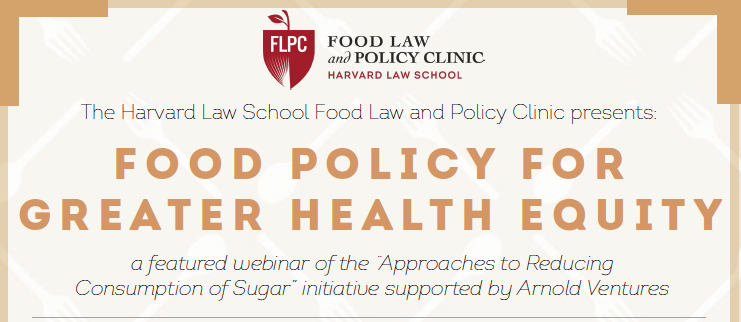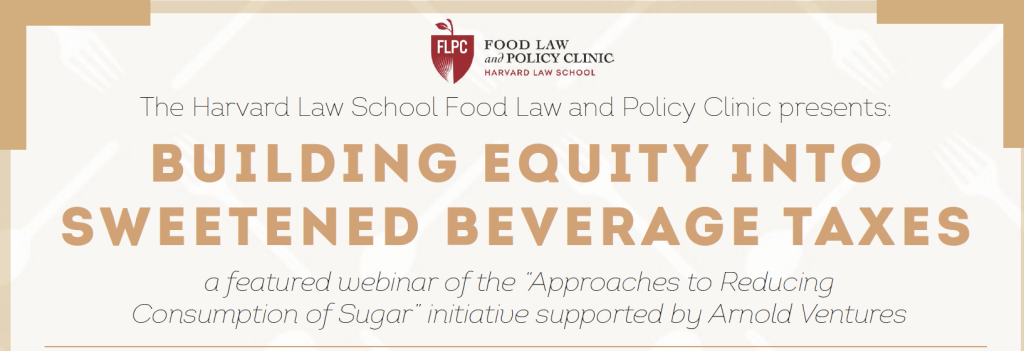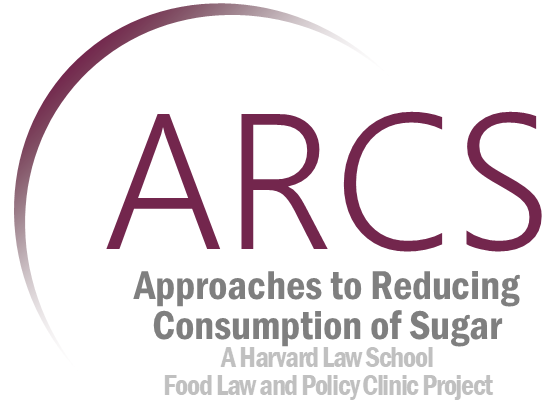Excess sugar consumption is linked to obesity, diabetes, and other diet-related chronic diseases that have tremendous social and economic costs. The United States currently faces the highest obesity and diabetes prevalence in human history. This national health crisis disproportionately impacts historically marginalized communities and thus perpetuates health inequities. Reducing population-level consumption of sugar is one of the most promising strategies for addressing these pressing public health, social, and economic concerns.
Our Approach
In 2018, the Food Law and Policy Clinic (FLPC), in collaboration with the Center for Health Law and Policy Innovation’s Health Law and Policy Clinic, launched the Approaches to Reducing Consumption of Sugar (ARCS) initiative to identify locally-supported policies that will reduce sugar consumption and build capacity for policy change. The ARCS project specifically aims to (1) support community-led policy change through direct pro bono technical assistance (TA) to community organizations, food policy councils, and local, state, and tribal government entities across the United States; (2) advance advocacy and policy change at the federal level; and (3) deliver resources that will help promote healthier food environments on a broader scale in the form of a virtual webinar series and a Sugar Reduction Law and Policy Toolkit.
Sugar Reduction Policy Virtual Webinar Series
FLPC hosted a series of online events to discuss the most equitable and effective policy options for reducing the consumption of food and beverages high in added sugar.
Webinar 1: Food Policy for Greater Health Equity

Featuring:
- Julie Ralston Aoki, Director of Healthy Eating and Active Living Programs, Public Health Law Center, Mitchell Hamline School of Law;
- Sara Bleich, Professor of Public Health Policy, Harvard T.H. Chan School of Public Health, Carol K. Pforzheimer Professor, Radcliffe Institute for Advanced Study;
- Erica Kenney, Assistant Professor of Public Health Nutrition, Director of MPH Program in Nutrition, Director of PhD Program in Public Health Nutrition, Harvard T.H. Chan School of Public Health; and
- Moderator: Christina Roberto, PhD, Mitchel J. Blutt and Margo Krody Blutt Presidential Associate Professor of Health Policy, University of Pennsylvania Perelman School of Medicine, Director, PEACH Lab, Associate Director of CHIBE.
Click here to view Q&A from Webinar 1.
Webinar 2: Building Equity into Sweetened Beverage Taxes

Featuring:
- Sabrina Adler, JD, Vice President of Law, ChangeLab Solutions;
- Jim Krieger, MD, MPH, Executive Director, Healthy Food America Clinical Professor of Medicine and Health Services, University of Washington;
- Kris Madsen, MD, MPH, Professor, Joint Medical Program, Public Health Nutrition and Community Health Sciences, University of California-Berkeley;
- Xavier Morales, PhD, MRP, Executive Director, The Praxis Project; and
- Moderator: Christina Roberto, PhD, Mitchel J. Blutt and Margo Krody Blutt Presidential Associate Professor of Health Policy, University of Pennsylvania Perelman School of Medicine, Director, PEACH Lab, Associate Director of CHIBE.
Click here to view supplemental resources from Webinar 2.
Supplemental Resources Links:
- Fundamentals of Preemption & Consequences of Preemption for Health & Equity
- Assessing and Addressing Preemption: A Toolkit for Local Policy Campaigns
- An Equity-First Approach to Assessing Preemption
- Tax Equity Report
- Seattle Tax Allocations
- Seattle CAB
Webinar 3: 2021 Virtual Sugary Drink Summit

The three-day event hosted by the Center for Science in the Public Interest (CSPI) brought together public health experts and advocates to deepen national, state, and local policies that build community capacity for advocacy, improve health and center health equity, while reducing consumption of sugary drinks.
Harvard Law School Food Law and Policy Clinic was featured in a workshop session: Paving the Way for Wins: Ground-Softening Policies and Engagement (CBEI). This session explored best practices for building community capacity to advance SSB policies at the state/local level and tips on introducing and passing ground-softening policies and/or community engagement that pave the way.
Featuring:
- Melissa Shapiro – Clinical Instructor, Harvard Law School Food Law and Policy Clinic
- Genoveva Islas – Founder and Director, Cultiva La Salud
- Leroy “Buster” Silva – Wellness Advocate; Community Organizer; Founder, Family+Indegenize+Thrive
- Moderator: Ribkah Naga – Field Organizing Manager, Center for Science in the Public Interest
Webinar 4: Reducing Health Disparities Through Sugary Drink Taxes – a Policy Summit for Policymakers

Communities across the country have provided pregnant and new mothers with vital nutrition, expanded pre-K programs to thousands of underprivileged children and provided millions of dollars in grocery vouchers to seniors and families experiencing food insecurity, and it is all because of the revenue raised from sugary drink taxes.
Voices for Healthy Kids and the Food Law and Policy Clinic at Harvard Law School co-hosted a two-session Policy Summit for Policymakers interested in reducing health disparities and improving equity. This Summit featured experts who covered various aspects of sugary drinks tax policy. Attendees learned the breadth of resources and supports available to champion these efforts to reduce health disparities and improve equity.
Featuring:
Session 1
- Lori Fresina, Voices for Healthy Kids
- Christina a. Roberto, Ph.D, Perelman School of Medicine, University of Pennsylvania
- Xavier Morales, Praxis Project
- Larry Suffredin, Cook County Commissioner
- Gloria Begay, Navajo Nation
- Moderator: Terra Hall, Voices for Healthy Kids
Session 2
- Emily M. Broad Leib, Harvard Law School Food Law and Policy Clinic
- Jake Zychick, AHA- Philadelphia
- Lizzie Velten, AHA – Bay Area
- Hannah Hill, City of Seattle
- Elizabeth Crowne, Boulder Health Equity Advisory Committee
- Marcel Pratt, former City Solicitor for Philadelphia
- Claudia Goytia, Policy Engagement Manager, Voices for Healthy Kids
